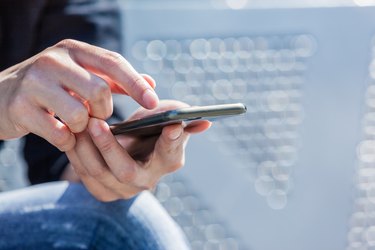
The international mobile equipment identity, or IMEI number, is essentially a serial number for your cellphone. Your SIM card has its own unique number, called the international mobile subscriber identity, or IMSI. Police and cellphone companies can track phones using these numbers, but the average person might have more luck using "track my phone" apps from their phone carriers.
Understanding the IMSI and IMEI
Video of the Day
Every modern cellphone has its own unique identifier called the international mobile equipment identity, or IMEI. That's essentially a serial number for the phone. Your carrier usually has it on file, and you can usually access it through the menus on a smart phone or by entering special codes on other types of cellphones.
Video of the Day
Your SIM card also has its own unique number, called the international mobile subscriber identity, or IMSI. That essentially identifies your cellphone account and includes a code identifying the carrier that issued your plan. If you have multiple SIM cards, they'll each have their own IMSI code, but your phone will typically have only one IMEI.
Both numbers are distinct from your phone number, and they can't be used to dial your phone. There's generally no reason for you to give your IMSI or IMEI to anyone and, other than in certain circumstances like activating a new phone or deactivating an old one, no reason for you to have to know these numbers.
IMSI and IMEI Tracker Technology
Police sometimes use tracking devices known as IMSI catchers, or Stingrays, to monitor cellphone movements. These machines essentially impersonate cellphone towers and intercept communications from cellphones, including their IMSI and IMEI codes.
Therefore, a network of IMSI catchers can tell what cellphone users are in what areas at what times. Criminals and spies may also use these devices for their own purposes.
While it may be possible to build your own IMSI catcher, you should consider the ethical and legal consequences before doing so, since you'll be acquiring information about the whereabouts of your neighbors if you use the device.
Tracking Your Cellphone
When you simply want to track your own cellphone, you don't usually need the IMEI to do so.
If you think the phone is stolen, you can contact the police for help recovering it and contact your phone carrier to disconnect the account so it can't be used to make calls on your bill. With an iPhone or Android smart phone, you can have Apple or Google, respectively, log you out of the device.
If you're not sure where the phone is, you can use tools from Apple or Google to find it. You don't need to have the IMEI or the IMSI, but you do need a cloud account for your phone's operating system maker and generally need to have previously opted in. Apple calls its system "Find My iPhone," and Google's is usually known as "Find My Device."
- Tom's Guide: Can You Hear Me Now? How Police Track Your Cellphone
- Samsung: Find Your Phone's IMEI or Serial Number
- Techopedia: International Mobile Subscriber Identity (IMSI)
- Washington Post: Signs of Sophisticated Cellphone Spying Found Near White House, U.S. Officials Say
- Ars Technica: Low-Cost IMSI Catcher for 4G/LTE Networks Tracks Phones’ Precise Locations
- Apple: Track and Find Your Missing Apple Device
- Google: Find My Device